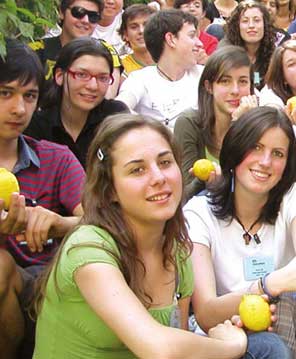
Picture by Yama
La famiglia è un’istituzione e un valore molto importante nella società italiana.
Spesso, gli italiani trovano la loro “rete di sicurezza” nella famiglia. Nei momenti di crisi, quando c’è una necessità, generalmente la famiglia è sempre lì, pronta ad aiutare. A causa di questo forte legame, gli italiani hanno la tendenza a passare molto tempo con la famiglia. Le domeniche o durante le feste, visitare la famiglia è comune.
E tu? Hai una famiglia grande o piccola? Hai fratelli naturali, acquisiti o amici fraterni?
Family is a very important value and institution in Italian society.
Italians frequently find their “safety net” in the family. In time of crisis, when there is a need, the family is usually available, ready to help. Due to this strong bond, Italians tend to spend a lot of time with the family. On Sundays, or during the holidays, visiting the family is a common habit.
How about you? Do you have a large or a small family? Do you have natural brothers/sisters, stepbrothers/sisters or close friends?
To practice Italian this week we invite you to read and watch…
PRACTICE HERE: Italian/English Version
Para practicar el idioma italiano esta semana te invitamos a leer y mirar…
PRACTICA AQUÍ: Versión Italiano/Española
Picture by Yama
 Secondo alcuni sondaggi, i giovani italiani guardano molto la televisione, usano sempre di più le nuove tecnologie e non dimenticano libri e quotidiani.
Secondo alcuni sondaggi, i giovani italiani guardano molto la televisione, usano sempre di più le nuove tecnologie e non dimenticano libri e quotidiani.
 Rino Gaetano è un artista versatile e un ottimo musicista che purtroppo ci ha lasciato molto giovane a causa di un incidente stradale. Gli italiani lo considerano ancora fra i migliori e più amati cantautori.
Rino Gaetano è un artista versatile e un ottimo musicista che purtroppo ci ha lasciato molto giovane a causa di un incidente stradale. Gli italiani lo considerano ancora fra i migliori e più amati cantautori.
 Gli italiani sono sportivi? Hanno un buon equilibrio fra il tempo che dedicano al mangiare e quello che dedicano allo sport?
Gli italiani sono sportivi? Hanno un buon equilibrio fra il tempo che dedicano al mangiare e quello che dedicano allo sport? Agli italiani piace passare tempo in casa.
Agli italiani piace passare tempo in casa. Il pittore olandese Carel Willink ha contribuito alla riscoperta di uno dei più misteriosi tesori d’Europa. È sorprendente che così poche persone conoscano questo parco bizzarro, pieno di enormi e stranissime statue disseminate sopra una collina vicino alla cittadina di Bomarzo, nel centro Italia.
Il pittore olandese Carel Willink ha contribuito alla riscoperta di uno dei più misteriosi tesori d’Europa. È sorprendente che così poche persone conoscano questo parco bizzarro, pieno di enormi e stranissime statue disseminate sopra una collina vicino alla cittadina di Bomarzo, nel centro Italia. L’umorismo è ciò che ha sempre aiutato gli italiani a superare le crisi e i momenti difficili.
L’umorismo è ciò che ha sempre aiutato gli italiani a superare le crisi e i momenti difficili. “Chi mangia bene sta molto vicino a Dio.” È una frase celebre del film Big Night, una commedia divertente che ti raccomandiamo di vedere.
“Chi mangia bene sta molto vicino a Dio.” È una frase celebre del film Big Night, una commedia divertente che ti raccomandiamo di vedere. Umberto Eco, amatissimo filosofo, pensatore e scrittore italiano, non è più fra noi.
Umberto Eco, amatissimo filosofo, pensatore e scrittore italiano, non è più fra noi. Qualcuno dice che gli italiani non amano i numeri, sono troppo freddi. Preferiscono invece il calore dell’umanesimo.
Qualcuno dice che gli italiani non amano i numeri, sono troppo freddi. Preferiscono invece il calore dell’umanesimo.